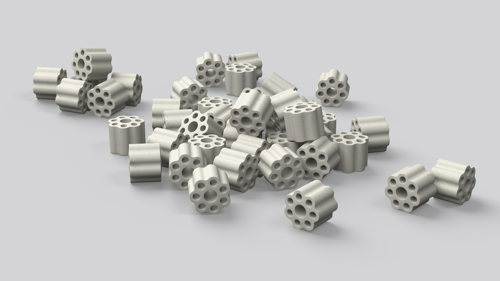Clariant upgrades its syngas catalyst portfolio to reduce emissions and improve economics
- ReforMax™ LDP Plus, ShiftMax™ 217 Plus, and AmoMax™ 10 Plus catalysts were developed to enhance economics and reduce emissions of syngas plants
- The advanced versions of renowned catalysts have already proven their designed benefits at commercial scale
- The PLUS series catalysts enable a more energy-efficient production of blue hydrogen and green ammonia, supporting greater sustainability in the energy and chemical industries
Clariant announced that its new Plus series syngas catalysts have been successfully introduced to the market. Over the past five years, the company upgraded its portfolio of syngas catalysts, launching ReforMax LDP Plus, ShiftMax 217 Plus, and AmoMax 10 Plus catalysts. Based on their renowned forerunners, the new catalysts were designed as drop-in solutions to improve plant economics and reduce carbon emissions. These benefits have now been demonstrated in commercial use with highly favorable results.

Georg Anfang, Vice President Syngas and Fuels at Clariant Catalysts, commented, “The transition to decarbonize the chemical and energy industries is lengthy and every ton of CO2 savings counts to reach our ultimate goal of net zero. This is precisely why our syngas Plus catalysts were developed – and what they deliver: Drop-in solutions to improve the efficiency and sustainability of existing assets and facilitate the deployment of new applications like low-carbon hydrogen and ammonia. These innovative catalysts are the latest example of Clariant´s commitment to catalyzing the world´s journey towards sustainable chemicals and fuels.
The ReforMax LDP Plus series is a new generation of steam reforming catalysts for producing hydrogen, ammonia, and methanol. Due to their flower-like 8-hole shape, the catalysts can reduce pressure drop in the reactor by up to 20% compared to predecessor catalyst shapes. The unique shape also improves heat transfer, resulting in additional energy savings and longer service life of the reformer tubes. ReforMax 330 LDP Plus was first installed over 6 years ago in a European ammonia plant with a nameplate capacity of 1650 mtpd. The catalyst has demonstrated approximately 20% lower pressure drop since start-up compared to the previously loaded ReforMax 330 LDP. After more than 6 years of operation, operation is stable and close to equilibrium, and thermal imaging of tube wall temperatures shows good heat distribution throughout the furnace.
In total, ReforMax LDP Plus catalysts are in use in more than 40 production plants around the world, where they have contributed to increased plant productivity.
The low temperature water gas shift catalyst ShiftMax 217 Plus offers the high activity and stability of its predecessor, but with significantly greater selectivity. This reduces the formation of methanol, which is not only an undesired by-product but also a regulated volatile organic compound (VOC). Overall, ammonia producers benefit from higher product yields at lower energy consumption. The catalyst was installed, among other locations, at an ammonia plant in Europe two years ago and has reduced methanol formation by more than 50%. VOC limits are now easily met, and the plant can expect considerable cost savings over the catalyst’s expected 6-year lifetime.
AmoMax 10 Plus represents Clariant’s new era of wustite catalysts for ammonia synthesis. Based on the industry-proven AmoMax 10, the new version has an improved promoter set that increases activity and robustness against catalyst poisons and allows faster catalyst startups. It also enables operation with higher per-pass conversion as well as lower loop pressure. Consequently, the catalyst can be used to increase ammonia production and/or to reduce energy consumption. For example, in operation at an ammonia plant in Europe since 2021, the catalyst has enhanced overall plant efficiency, showing a 24% higher relative activity compared to the typical performance of the previous generation.
Combined, the catalysts of Clariant’s Plus series offer producers a comprehensive solution for improved performance and sustainability throughout the syngas value chain: reforming, water gas shift, and synthesis. With today’s rising energy costs and pressing challenges of carbon emissions, every improvement in a plant’s operation is highly beneficial for producers and the planet.






Comments